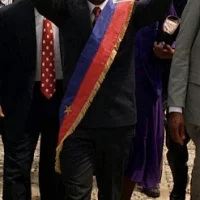The Solidarity Movement. Perestroika and Glasnost. The fall of the Berlin Wall. All of these movements, policies, or events had a tremendous influence on the dissolution of communism in Eastern Europe and the end of the Cold War. While not attributed the same attention and certainly less well known, many diplomats operating behind the Iron… Read More "Chipping Away at Czechoslovak Communism: The Helsinki Final Act and Charter 77"
Bombing North Vietnam into Accepting Our Concessions: Christmas Bombings, 1972
President Richard Nixon ordered plans for retaliatory bombings of North Vietnam after talks to end the war in Vietnam broke down December 13, 1972. Operation Linebacker II, otherwise known as the “Christmas Bombings,” began December 18 and lasted for two weeks. A total of 741 B-52 sorties were dispatched, dropping 20,000 tons of bombs on… Read More "Bombing North Vietnam into Accepting Our Concessions: Christmas Bombings, 1972"
Haiti has long been plagued by coups d’état and regime changes, leading to long-time political instability and weak governance. In this volatile political field, it was easy for a Haitian leader to assume dictatorial powers, as was the case with President François Duvalier, also known as “Papa Doc.” After becoming the President of Haiti in… Read More "The Overthrow of Haiti’s Aristide"
Establishing an Escape Network in Post-War Hungary
Throughout most of World War II, Hungary operated in conjunction with the Axis Powers and actively contributed to the Nazi war effort under the leadership of Miklós Horthy. While invading Soviet troops had pushed out the occupying German forces by April 1945, the newly established Russian presence quickly posed a precarious threat to Hungarian stability… Read More "Establishing an Escape Network in Post-War Hungary"
“How many people can you fit on a 747?”- Operations Sheba and Solomon
The Ethiopian Aliyah, as it is known in Israel, was the migration during the 1980’s of thousands of Ethiopian Jews [known in Amharic as Falashas; some consider the term pejorative] to Israel. The Israeli Defense Force (IDF) played a major role in the evacuation of the Ethiopian Jews as they came under increasing threat from… Read More "“How many people can you fit on a 747?”- Operations Sheba and Solomon"
Beginning of a Beautiful Friendship: The 1951 Treaty of Peace with Japan
The San Francisco Peace Treaty, signed by 48 nations on September 8, 1951, officially ended Japan’s position as an imperial power, provided compensation to those who had suffered in Japan during the Second World War, and terminated the Allied post-war occupation of Japan. The treaty’s seven chapters and preamble marked the end of hostilities between the signatories… Read More "Beginning of a Beautiful Friendship: The 1951 Treaty of Peace with Japan"
Seeking a Peace Settlement with Shimon Peres, Hawk and Dove
The passing of Israeli statesman Shimon Peres on September 28, 2016 was deeply felt by U.S. diplomats who had worked with him through the decades. Former U.S. Ambassador to Israel Daniel Kurtzer wrote: “Some will criticize Peres for his early years as a security hawk, while others will be critical of his later years as… Read More "Seeking a Peace Settlement with Shimon Peres, Hawk and Dove"
An Embassy in Flames: Islamabad, 1979
The November 21, 1979 attack on the American Embassy in Islamabad started as a small group demonstration in front of the embassy, where protesters shouted anti-American slogans and demanded entry into the campus. Police officers were able to stop the protesters and have them leave the area. However, about fifteen minutes later, some six busloads of Pakistani… Read More "An Embassy in Flames: Islamabad, 1979"
Algeria’s Struggle for Independence
The modern-day People’s Democratic Republic of Algeria is now a proud, sovereign state in North Africa that readily influences the region. However, before 1962, Algeria had been a French colony, dating back to the French invasion of Algiers in 1830. Following a brutal conquest that some termed as genocide, France began a policy of “civilizing”… Read More "Algeria’s Struggle for Independence"
Anatomy of an Overthrow: How an African Leader was Toppled
A council of combined security forces known as the Derg staged a coup d’état on September 12, 1974 against Ethiopian Emperor Haile Selassie I, arresting and imprisoning the monarch who had ruled for decades. The committee renamed itself the Provisional Military Administrative Council, took control of the government, soon abolished the monarchy and established Marxism-Leninism… Read More "Anatomy of an Overthrow: How an African Leader was Toppled"

